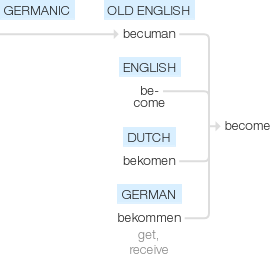Become
Old English becuman ‘come to a place, come (to be or do something)’ (see be-, come), of Germanic origin; related to Dutch bekomen and German bekommen ‘get, receive’.
wiktionary
A compound of the sources of be- and come. From Middle English becomen, bicumen, from Old English becuman(“to come (to), approach, arrive, enter, meet with, fall in with; happen, befall; befit”), from Proto-Germanic *bikwemaną(“to come around, come about, come across, come by”), equivalent to be-(“about, around”) + come. Cognate with Scots becum(“to come, arrive, reach a destination”), North Frisian bekommen, bykommen(“to come by, obtain, receive”), West Frisian bikomme(“to come by, obtain, receive”), Dutch bekomen(“to come by, obtain, receive”), German bekommen(“to get, receive, obtain”), Swedish bekomma(“to receive, concern”), Gothic 𐌱𐌹𐌵𐌹𐌼𐌰𐌽( biqiman, “to come upon one, befall”). Sense of "befit, suit" due to influence from Middle English cweme, icweme, see queem.
etymonline
become (v.)
Old English becuman "happen, come about, befall," also "meet with, fall in with; arrive, approach, enter," from Proto-Germanic *bikweman (source also of Dutch bekomen, Old High German biqueman "obtain," German bekommen, Gothic biquiman). A compound of the sources of be- and come.
Meaning "change from one state of existence to another" is from 12c. Older sense preserved in what has become of it? It drove out Old English weorðan "to befall." Meaning "to look well, suit or be suitable to" is early 14c., from earlier sense of "to agree with, be fitting or proper" (early 13c.).
